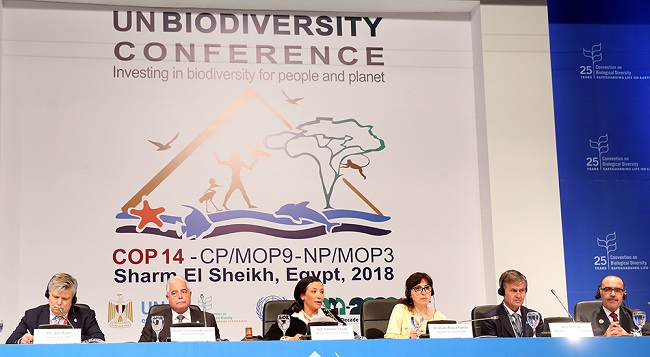African Ministers of Environment together with partner organisations have committed to an ambitious action agenda taking a coherent approach to addressing the interlinked challenges of biodiversity loss, land degradation and climate change. The action agenda will accelerate commitments for ecosystem restoration to improve resilience in the region. Their deliberations represented the opening sessions of the 2018 UN Biodiversity Conference.

The African Ministerial Summit on Biodiversity was held on November 13, 2018 at Sharm El-Sheikh International Congress Centre in Egypt, under the theme: “Land and ecosystem degradation and restoration: priorities for increased resilience in Africa.”
The Summit brought together more than 100 delegates including over 30 ministers responsible for the environment and other sectors, six ambassadors plus other heads of delegation along with key partners. The delegates discussed Africa’s biodiversity priorities and identified strategic actions and opportunities to upscale commitments for combating land degradation and enhancing ecosystem restoration.
Dr. Yasmine Fouad, Minister of Environment of Egypt, said: “I am honoured to have hosted this first African Ministerial Summit on Biodiversity which I am convinced will lead the way to promoting natured-based solutions for increased resilience and wellbeing of people in Africa.”
Dr. Cristiana Pașca Palmer, Executive Secretary of the Convention on Biological Diversity, said: “The adoption of the African Ministerial Declaration on Biodiversity and the Pan-African Action Agenda on Ecosystem Restoration for Increased Resilience by the Summit provides an impetus for the achievement of the Aichi Biodiversity Targets and will contribute to shaping a New Deal for Nature and People in 2020.
“Your political leadership, paired with the support of the African Union Commission, the New Partnership for Africa’s Development Agency, and the United Nations system, has elevated the importance of restoration in achieving our 2050 Vision of “living in harmony with nature”. The Secretariat of the Convention stands ready to further support this work.”
In a series of interactive dialogues, the summit participants reviewed the status and trends in land and ecosystem degradation in Africa and their impacts on biodiversity and ecosystem services and people’s wellbeing. They shared experiences, successes and lessons learned on ecosystem restoration in the region.
Several Ministers and delegates presented their national commitments and actions taken on ecosystem restoration. For example:
- Cameroon has committed to restoring 12 million hectares of degraded and deforested lands, which represents over half of the country’s total forested area.
- Ethiopia has restored millions of hectares of degraded forest areas by mass mobilisation and active participation of local farmers and has committed to restore 15 million hectares of forests.
- Uganda plans to restore up to 3 million hectares of forest and over 1 million hectares of wetlands by 2040.
- Chad highlighted their work on ecosystem restoration in the context of the Great Green Wall of the Sahara and Sahel and work on restoration of Lake Chad.
- Guinea is planting 100 hectares of trees each year to restore degraded ecosystems.
- Niger plans to restore 213,000 hectares of degraded land yearly, stabilise 36,500 hectares of sand dunes, and assist the natural regeneration of 70,000 hectares as part of its commitment to restore 3.2 million hectares by 2030.
- Seychelles has adopted an ecosystem-based approach to dealing with all three Rio Conventions and has committed to completely restore all its important water catchments.
- Burkina Faso has committed to restoring 5.16 million hectares of degraded land by 2030.
- Sudan is implementing ecosystem-based adaptation projects to address the impacts of climate change to address biodiversity loss, climate change and land and ecosystem degradation.
- South Africa has developed a National Action Programme to address desertification, land degradation and drought.
- Algeria has committed to restoring natural ecosystems to an area of at least 5 million hectares by 2030.
- The Gambia commits to halt the conversion of forests and wetlands to other land cover classes by 2025.
- Madagascar has committed to restoring 4 million hectares of degraded land and forest.
- Kenya has committed to restoring 5.1 million hectares of land.
The Pan-African Action Agenda, endorsed by the Summit, will be submitted for adoption by the African Union Assembly of Heads of State and Government at its 32nd Ordinary Session in January 2019.
It is expected that the Pan-African Action Agenda will provide a strategic direction for ecosystem restoration in the region, promote continent-wide awareness and political support for restoration efforts, help to accelerate and upscale ecosystem restoration commitments and targets; and galvanise synergetic and integrated action towards the achievement of those commitments and targets.
The UN Biodiversity Conference continues, with the High-Level Segment being held from November 14 to 15, and the opening of the negotiations by the Parties to the Convention on November 17, 2018.
